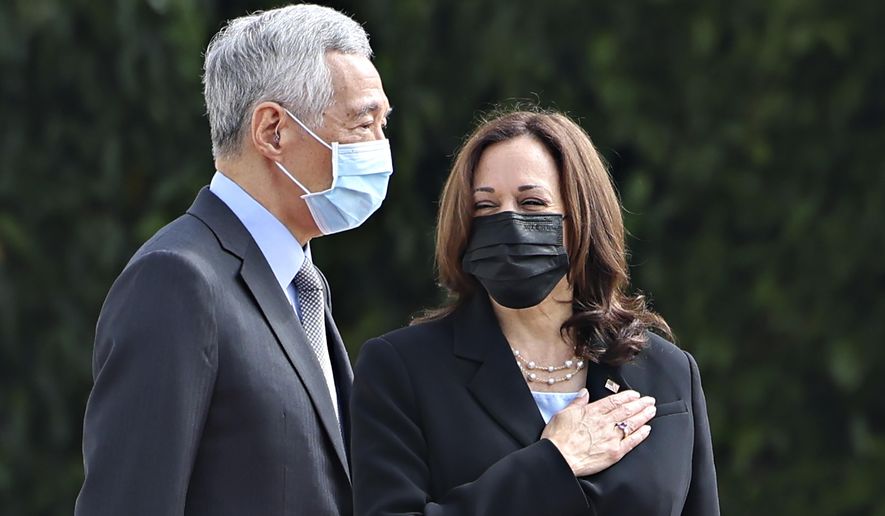Vice President Kamala Harris will arrive Tuesday in Vietnam, of all places, on an awkwardly timed trip during the Biden administration’s worst foreign policy crisis, which is drawing parallels to the embarrassing U.S. evacuation of Saigon.
The chaotic American withdrawal from Afghanistan has already overshadowed Ms. Harris’ trip, which is intended to strengthen U.S. alliances in Southeast Asia against China. During her first stop, in Singapore, the vice president dodged reporters’ questions Monday about the administration’s failure to prepare for the Taliban’s takeover of Kabul.
“I think there’s going to be plenty of time to analyze what has happened and what has taken place in the context of the withdrawal from Afghanistan,” she told reporters. “But right now, we are singularly focused on evacuating American citizens, Afghans who worked with us and Afghans who are vulnerable, including women and children.”
Ms. Harris was quiet about the crisis before leaving the U.S.
Before the fall of Kabul, many viewed the vice president’s second trip abroad as a low-profile opportunity to obscure the memory of her much-maligned excursion to Central America in June, when she was hounded by questions about failing to visit the U.S. southern border.
Her glib response was that she hadn’t been to Europe, either. For her second trip, the administration sent her a dozen time zones in the opposite direction.
SEE ALSO: History As It Happens: Vietnam redux
“It’s a reversion to a model of vice president that we haven’t had since before Al Gore — the notion of a vice president who’s completely irrelevant,” said James Jay Carafano, a national security specialist at the conservative Heritage Foundation. “Starting with Gore, every vice president’s been an integral part of the presidential decision-making team.”
President Biden has said repeatedly that Ms. Harris is a key adviser whom he consults regularly. Ms. Harris has highlighted that she was “the last person in the room” with Mr. Biden in April before he announced his decision to withdraw all U.S. troops from Afghanistan, linking her closer to the disaster that followed.
Polling suggests that the botched withdrawal from Afghanistan also is hurting Ms. Harris, the Democrats’ heir apparent, whose negative image among voters is worsening.
Her image was 9 points underwater in an NBC News poll released Sunday, with 37% of voters having a positive view of the vice president and 46% viewing her negatively. That was down from January, when 41% of voters in the same poll viewed Ms. Harris positively and 41% negatively.
A Rasmussen Reports survey released last week found that 55% of likely voters say Ms. Harris is “not qualified” or “not at all qualified” to assume the duties of the presidency. The poll, taken Aug. 12-15 as the Taliban made rapid gains, found that 43% of voters said she is “qualified” or “very qualified” to be commander in chief.
In April, the same poll showed that 49% of likely voters thought Ms. Harris was qualified to become president.
The vice president’s next stop, in Hanoi, is drawing inevitable comparisons to the humiliating fall of Saigon in 1975 at the end of the Vietnam War, when helicopters ferried evacuees from the roof of the U.S. Embassy.
Former Trump press secretary Sean Spicer tweeted that the writers of the sitcom “Veep” “could not have scripted this better.”
Administration officials say Ms. Harris doesn’t care about comparisons between Afghanistan and Vietnam.
“We’re not focused on the history of the Vietnam War; we’re focused on what’s going on today in Afghanistan and doing everything we can to have the most successful outcome,” a senior administration official told reporters. “Vietnam today is an increasing partner of the United States. And that’s why the vice president is going.”
The official said Southeast Asia and the Indo-Pacific are strategically and economically important, “and that hasn’t changed with Afghanistan.”
Ms. Harris said Monday in Singapore, “The reason I am here is because the U.S. is a global leader, and we take that role seriously.”
Vietnam’s largest city, Ho Chi Minh City, formerly Saigon, went into a lockdown Monday to battle its worst outbreak of the COVID-19 pandemic just ahead of Ms. Harris’ arrival. The government reported 737 deaths from COVID-19, the highest single-day total in the southern region since the pandemic started.
Hanoi is about 700 miles to the north and is also under lockdown.
Ms. Harris is expected to attend the opening of the Hanoi office of the Centers for Disease Control and Prevention, which will be the U.S. agency’s regional office for Southeast Asia.
• Dave Boyer can be reached at dboyer@washingtontimes.com.




Please read our comment policy before commenting.